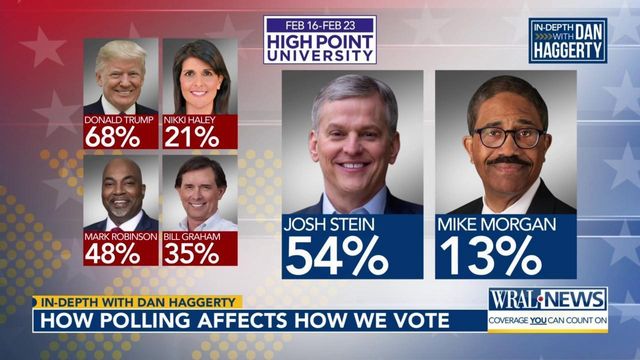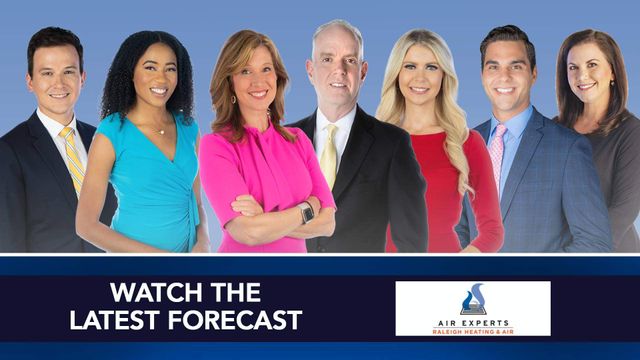How polls influence voter behavior, candidates skip debates before Super Tuesday primaries
Super Tuesday marks when 15 states vote in the Republican and Democratic primaries, including North Carolina.
The polls open from 6:30 a.m. to 7:30 p.m. Tuesday in North Carolina.
Some people choose not to vote because they're disillusioned.
The polls indicate the outcomes of the primary races are pretty much determined.
A High Point University poll conducted between Feb. 16-23 shows Donald Trump beating Nikki Haley by 47 points. It has Mark Robinson winning the Republican primary for governor by 13 points, and Josh Stein in the Democratic primary by 41 points.
A Meredith College poll has Robinson by at least 20 points, and Stein by up to 30.
However, polls have been wrong before and can be wrong again.
ABC, Ipsos, CBS, NBC, Pew Research, CNN and Fox all had Hillary Clinton beating Donald Trump in the 2016 general election. They were wrong.
The 1980 presidential election saw Jimmy Carter versus Ronald Reagan. The polls had Carter winning by as many as 30 points. In the end, Reagan won by 9.
A 2018 study published in the journal "Nature Human Behavior" looked at 30,000 polls from all over the world over the course of 75 years. It found, "contrary to conventional wisdom, the recent performance of polls has not been outside the ordinary. If anything, polling errors are getting smaller on average.”
A 2020 study from the University of California at Berkeley found polls are spot on, at least 60% of the time.
Think of it like the weather forecast. Meteorologists use science and data to predict the weather. The result isn't perfect, but it's pretty close.
Polling like weather forecasts are correct more often than they are wrong, and they can impact voter behavior.
"There is what we call the wisdom of the crowds, where a group of people tend to be smarter as a whole than the individuals in it,” said Stanford social psychologist and political science professor Jon Krosnick. “And, polls tell us the wisdom of the crowds, and if you've got a candidate early on who is polling at 3 percentage points. If people are saying, ‘no thank you,’ that is helpful for the process."
Neil Malhotra of Stanford’s Graduate School of Business and David Rothschild of Microsoft Research experimented on how polls affected behavior in 2012. People were asked a handful of public policy questions without seeing any polls and then again after seeing polling results.
When participants learned experts favored a position, opinions shifted by 11%.
Opinions from people like them shifted by 6%.
When the poll showed a majority favored the opposite side of an issue, opinions shifted by 8%.
The experiment's conclusion found that, "Voters are searching for the wisdom of the crowds.”
Krosnick also said polls aren't about picking an early winner but providing new information to help voters come election day.
"If there were no scores, if you didn't know how the teams were doing, I think we'd all be less attentive,” Krosnick said. “What we've learned from really good scientific research is by turning politics into a sporting match and grabbing [the] attention of Americans who are like, ‘Who's ahead, who's behind in what researchers call horse race polling … that you learn about politics.
“You learn about the state of the country. You learn facts. Like, you can't help but watch a football game and not learn something about the history of the quarterbacks. And so, by the time you have to cast your vote, you're smarter about the people and the country that you're voting on."
A study in the Journal of Consumer Research found something similar, "Depending on which candidate voters expect to win...polls can have no effect, lead voters to change expectations... or lead voters to change their preferences and their voting behavior."
Why candidates choose not to debate
It's not just voter behavior that's changing, it's the candidates too. Several candidate are choosing not to participate in debates anymore.
Donald Trump didn’t do one debate before Tuesday primary because the polls told him that he didn’t have to.
Neither did Mark Robinson on his way to the governor's race.
The logic is: If you’re in the lead, why risk it?
There are several ways for candidates to get their messages out:
- Social media: Candidates’ teams control the messages and comment section.
- Advertisements: Politicians or political groups carefully craft a one-sided argument.
- Rallies: Speakers can stay on a message and speak to supporters who aren’t there to challenge a candidate’s ideas.
- Media stories: Reporting can carry bias — sometimes inadvertently — like a soundbite edited for time and sometimes blatantly. Certain networks favor one party over the opposition and vice versa.












